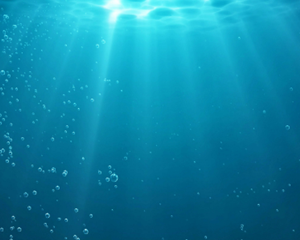The daily cycle of the sun has a profound influence on life in the deep ocean.
太阳每日的循环对深海生物有决定性的影响。
As the sun sets, it triggers the largest migration of living organisms on our planet.
太阳的下沉,触动了地球上规模最庞大的生物迁徙。
One thousand million tonnes of animals travel up from the dark zone into richer, shallower water, every night.
每晚有十亿公吨的动物从黑暗区上游到浅水域。
Tiny grazers are first up searching for the microscopic plants that only grow in shallow sunlit waters.
小小的草食性动物最早报到,找寻只生长在有日照的浅水域的微小植物。
Predators follow the grazers.
肉食动物则紧跟着草食性动物。
An enormous variety of different animals join the convoy or feed off it as it passes.
各类动物种类繁多,也加入行进的队伍,或是在它们经过时饱餐一顿。
Many will travel up hundreds of metres towards the surface,
许多动物会上游几百公尺到水面附近,
and then at dawn finding themselves at greater risk from predators, the visitors return to the safer darkness of the depths.
然后在日出时为了要躲避暴露在天敌面前的危险,访客们又回到安全的幽暗深海。

The sun's rays only have a direct effect in the top hundred metres, or so, of the ocean.
阳光只对上面一百公尺的海水有直接的影响。
It's only here that photosynthesis can take place and coral reefs can flourish.
光合作用只有在这里可以进行,珊瑚礁也只能在这里形成。
Leave this thin, rich slice of life and travel over the outer face of the reef, and you quickly enter a far more demanding world.
离开这薄薄一层丰富的生命之源,越过了珊瑚礁的边缘,你马上就进入了另一个求生不易的世界。
Below a hundred and fifty metres photosynthesis becomes impossible. You find no plants, just animals.
在150公尺以下的海洋就无法行光合作用。这里没有植物,只有动物。
Here, the animals are adapted to catch marine snow, particles of dead animals and plants that drift down from above.
这里的动物惯以海洋雪为食,海洋雪就是从海面附近下沉的动植物残骸。
So they depend, second-hand, on the energy captured from the sun by organisms living in the surface waters.
所以它们所依靠的是水面附近生物捕捉到的太阳能源所转化的二手能源。
Travelling close to the sea floor, we're going to take a journey to the very bottom of the deep sea, to a world completely separate from the midwater above.
紧靠海床前进,我们要到深海海底旅行,到一个与其他水域完全分离的世界。



